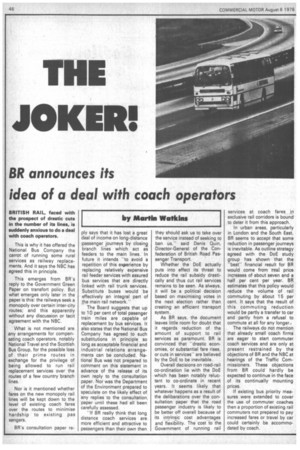THE JOKER!
Page 48

If you've noticed an error in this article please click here to report it so we can fix it.
BR announces its idea of a deal with coach operators
by Martin Watkins
BRITISH RAIL, faced with the prospect of drastic cuts in the number of its lines, is suddenly anxious to do a deal with coach operators.
This is why it has offered the National Bus Company the carrot of running some rural services as railway replacements, And it says the NBC has agreed this in principle.
This emerges from BR's reply to the Government Green Paper on transfort policy, But what emerges only later in the paper is this the railways seek a monopoly over certain inter-city routes; and this apparently without any discussion or tacit agreement with the NBC.
What is not mentioned are any arrangements for compensating coach operators, notably National Travel and the Scottish Bus Group, for the possible loss of their prime routes in exchange for the privilege of being allowed to run rail replacement services over the routes of a few country branch lines.
Nor is it mentioned whether fares on the new monopoly rail lines will be kept down to the level of existing coach fares over the routes to minimise hardship to existing pas sengers.
BR's consultation paper re ply says that it has lost a great deal of income on long-distance ipassenger journeys by closing branch lines which act as feeders to the main lines. In future it intends to avoid a repetition of this experience by replacing relatively expensive rail feeder services with assured bus services that are directly linked with rail trunk services. Substitute buses would be effectively an integral part of the main rail network."
The Board suggests that up to 10 per cent of total pasenger train miles are capable of replacement by bus services. It also states that the National Bus Company has agreed to such substitutions in principle so long as acceptable financial and industrial relations arrangements can be concluded. National Bus was not prepared to comment on this statement in advance of the release of its own reply to the consultation paper. Nor was the Department of the Environment prepared to speculate on the likely effect of any replies to the consultation, paper until these had all been carefully assessed.
"If BR really think that long distance coach services are more efficient and attractive to passengers than their own then they should ask us to take over the service instead of seeking to ban us," said Denis Quin, Director-General of the Confederation of British Road Passenger Transport.
Whether the DoE actually puts into effect its threat to reduce the rail subsidy drastically and thus cut rail services remains to be seen. As always, it will be a political decision based on maximising votes in the next .election rather than creating an efficient transport system,
As BR says, the document leaves little room for doubt that it regards reduction of the amount of support to rail services as paramount. BR is convinced that "drastic economies, or substantial fare rises, or cuts in servicesare believed by the DoE to be inevitable.
Overall decisions on road-rail co-ordination lie with the DoE which has been notably reluctant to co-ordinate in recent years. It seems likely that whatever happens as a result of the deliberations over the consultation paper that the road passenger industry is likely to be better off overall because of its intrinsic cost advantages and flexibility. The cost to the Government of running rail services at coach fares in exclusive rail corridors is bound to deter it from this approach.
In urban areas, particularly in London and the South East, BR seems to accept that some reduction in passenger journeys is inevitable, As outline strategy agreed with the DoE study group has shown that the "best" financial result for BR would come from real price increases of about seven and a half per cent per year. BR estimates that this policy would reduce the volume of rail commuting by about 15 per cent. It says that the result of this commuting reduction would be partly a transfer to car and partly from a refusal to commute at all for any longer., The railways do not mention that already small coach firms are eager to start commuter coach services and are only at present restrained by the objections of BR and the NBC at hearings of the Traffic Commissioners. These objections from BR could hardly be expected to continue in the face of its continually mounting prices.
If existing bus priority measures were extended to cover the use of commuter coaches then a proportion of existing rail commuters not prepared to pay increased fares or travel by car could certainly be accommodated by coach.




















































































